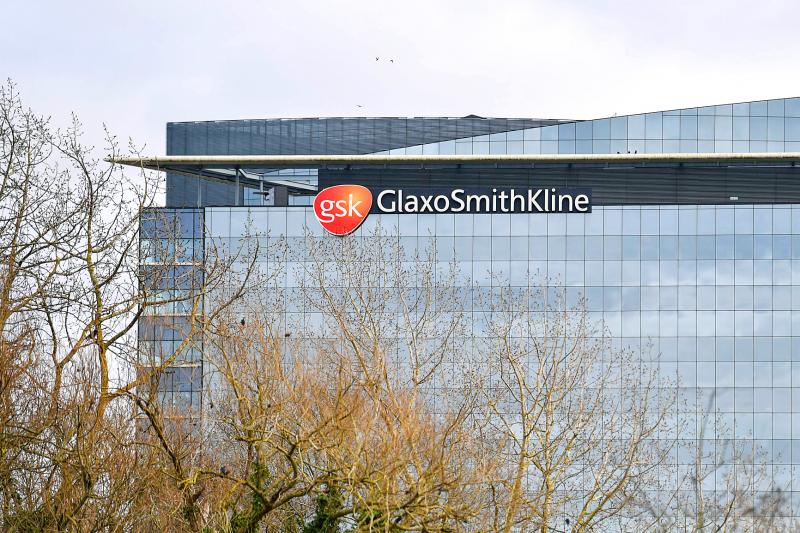GlaxoSmithKline PLC (GSK) racked up £1.4 billion (US$1.9 billion) in COVID-19-related sales last year, largely for antibody drug sotrovimab, as it beat quarterly forecasts in its first earnings report since rejecting a bid from Unilever PLC for its consumer arm.
The British drugmaker said it expected pandemic-related sales this year to be at similar levels to last year, but said these would contribute less to profit due to lower margins on its antibody treatment.
The performance is a boost for chief executive Emma Walmsley as GSK’s COVID-19 vaccines projects have fallen behind and the impending spinoff of the consumer venture with Pfizer Inc has put the future of the pharmaceuticals business in focus.

Photo: AFP
Adjusted earnings for the group stood at £0.256 per share for the three months to Dec. 31 last year, while turnover rose 13 percent to £9.53 billion at constant currency rates, topping a consensus of £0.238 apiece on sales of £9.49 billion.
“We have ended the year strongly, with another quarter of excellent performance ... and we enter 2022 with good momentum,” Walmsley said. “This is going to be a landmark year for GSK.”
The company is pressing on with the spinoff of the consumer arm, home to brands such as Sensodyne toothpaste and Advil painkiller, after rejecting a £50 billion buyout offer for the unit from Unilever in December.
GSK’s sotrovimab, developed with Vir Biotechnology Inc, is one of the few COVID-19 treatments shown to have worked against the fast-spreading Omicron variant of SARS-CoV-2, spurring huge demand. It was amongst GSK’s top selling offerings last year.
Countries around the world have ordered 1.7 million doses of sotrovimab, with the US striking a second deal for the treatment last month. Canada and the EU have also secured supplies.
Sales of sotrovimab, branded Xevudy, stood at £828 million in the fourth quarter, up from £114 million in the third quarter and well above market expectations of £774 million.
Revenue from shingles vaccine Shingrix, a key earnings driver over past quarters, slipped 7 percent to £597 million, as pandemic restrictions kept the elderly target group from seeking the shot, but sales surpassed consensus of £548 million.
The company said that sales this year, after the spinoff of its consumer arm, were expected to grow 5 to 7 percent and adjusted operating profit to grow 12 to 14 percent, including a boost from a settlement with Gilead Sciences Inc, but not sales of its COVID-19 products.

Taiwan’s foreign exchange reserves hit a record high at the end of last month, surpassing the US$600 billion mark for the first time, the central bank said yesterday. Last month, the country’s foreign exchange reserves rose US$5.51 billion from a month earlier to reach US$602.94 billion due to an increase in returns from the central bank’s portfolio management, the movement of other foreign currencies in the portfolio against the US dollar and the bank’s efforts to smooth the volatility of the New Taiwan dollar. Department of Foreign Exchange Director-General Eugene Tsai (蔡炯民)said a rate cut cycle launched by the US Federal Reserve

Handset camera lens maker Largan Precision Co (大立光) on Sunday reported a 6.71 percent year-on-year decline in revenue for the third quarter, despite revenue last month hitting the highest level in 11 months. Third-quarter revenue was NT$17.68 billion (US$581.2 million), compared with NT$18.95 billion a year earlier, the company said in a statement. The figure was in line with Yuanta Securities Investment Consulting Co’s (元大投顧) forecast of NT$17.9 billion, but missed the market consensus estimate of NT$18.97 billion. The third-quarter revenue was a 51.44 percent increase from NT$11.67 billion in the second quarter, as the quarter is usually the peak

Nvidia Corp’s major server production partner Hon Hai Precision Industry Co (鴻海精密) reported 10.99 percent year-on-year growth in quarterly sales, signaling healthy demand for artificial intelligence (AI) infrastructure. Revenue totaled NT$2.06 trillion (US$67.72 billion) in the last quarter, in line with analysts’ projections, a company statement said. On a quarterly basis, revenue was up 14.47 percent. Hon Hai’s businesses cover four primary product segments: cloud and networking, smart consumer electronics, computing, and components and other products. Last quarter, “cloud and networking products delivered strong growth, components and other products demonstrated significant growth, while smart consumer electronics and computing products slightly declined,” compared with the

The US government on Wednesday sanctioned more than two dozen companies in China, Turkey and the United Arab Emirates, including offshoots of a US chip firm, accusing the businesses of providing illicit support to Iran’s military or proxies. The US Department of Commerce included two subsidiaries of US-based chip distributor Arrow Electronics Inc (艾睿電子) on its so-called entity list published on the federal register for facilitating purchases by Iran’s proxies of US tech. Arrow spokesman John Hourigan said that the subsidiaries have been operating in full compliance with US export control regulations and his company is discussing with the US Bureau of